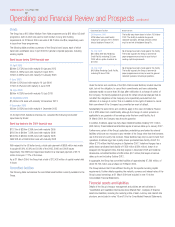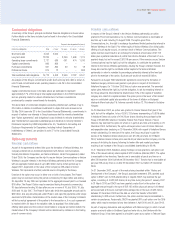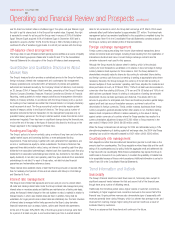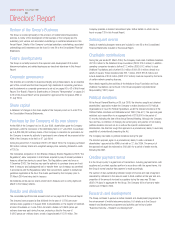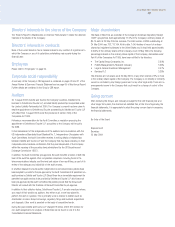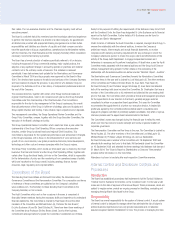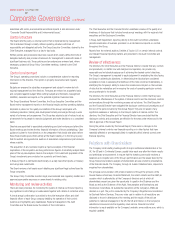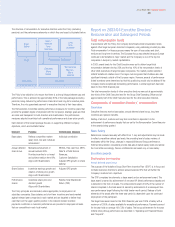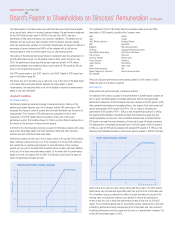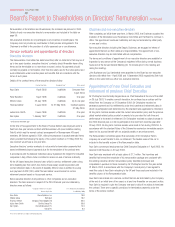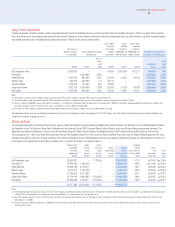Vodafone 2004 Annual Report Download - page 53
Download and view the complete annual report
Please find page 53 of the 2004 Vodafone annual report below. You can navigate through the pages in the report by either clicking on the pages listed below, or by using the keyword search tool below to find specific information within the annual report.
their duties. The non-executive directors and the Chairman regularly meet without
executives present.
The Board is confident that all its members have the knowledge, talent and experience
to perform the functions required of a director of a listed company. On appointment,
all directors are provided with appropriate training and guidance as to their duties,
responsibilities and liabilities as a director of a public and listed company and also
have the opportunity to discuss organisational, operational and administrative matters
with the Chairman, the Chief Executive and the Company Secretary. When considered
necessary, more formal training is provided.
The Board has a formal schedule of matters specifically referred to it for decision,
including the approval of Group commercial strategy, major capital projects, the
adoption of any significant change in accounting policies or practices and material
contracts not in the ordinary course of business. This schedule is reviewed
periodically. It was last reviewed and updated by the Nominations and Governance
Committee in March 2004 and its proposals were approved by the Board in May
2004. The directors have access to the advice and services of the Company Secretary
and have resolved to ensure the provision, to any director who believes it may be
required in the furtherance of his or her duties, of independent professional advice at
the cost of the Company.
The executive directors, together with certain other Group functional heads and
regional Chief Executives, meet on ten occasions each year as the Group Executive
Committee under the chairmanship of the Chief Executive. This Committee is
responsible for the day-to-day management of the Group’s businesses, the overall
financial performance of the Group in fulfilment of strategy, plans and budgets and
Group capital structure and funding. It also reviews major acquisitions and disposals.
Two management committees, the Group Operational Review Committee and the
Group Policy Committee, oversee, together with the Group Executive Committee, the
execution of the Board’s strategy and policy.
The Group Operational Review Committee, which meets ten times a year under the
chairmanship of the Group Chief Operating Officer, comprises other executive
directors, certain Group functional heads and regional Chief Executives. This
Committee is responsible for the operational performance and achievement of targets
of the Group’s business, with a focus on the enhancement of voice services and
growth of non-voice services, new global products and services, brand development,
technology and other cost and revenue synergies within the Group’s regions.
The Group Policy Committee, which meets six times each year, is chaired by the Chief
Executive. The Financial Director and the Group Chief Operating Officer, together with
certain other Group functional heads, join him on the Committee, which is responsible
for the determination of policy and the monitoring of non-operational areas of activity
which are important to the Group overall, including strategy, finance, human
resources, legal, regulatory and corporate affairs.
Committees of the Board
The standing Board committees are the Audit Committee, the Nominations and
Governance Committee and the Remuneration Committee. The composition and terms
of reference of these committees are published on the Company’s website at
www.vodafone.com. The Secretary to these standing Board Committees is the
Company Secretary or his nominee.
The Audit Committee, which met on five occasions in the year, is comprised of
financially literate members having the necessary ability and experience to understand
financial statements. The Committee is chaired by Paul Hazen (5) and the other
members of the Committee are Michael Boskin (5), Professor Sir Alec Broers*,
Dr John Buchanan (4) and Sir David Scholey (4). There have been three meetings of
the Committee since Professor Sir Alec Broers joined. Due to other business
commitments arranged before he joined the Committee, he attended one of these.
Solely for the purpose of fulfilling the requirements of the Sarbanes-Oxley Act of 2002
and the Combined Code, the Board has designated Dr John Buchanan as its financial
expert on the Audit Committee. Further details of Dr Buchanan can be found in
“Directors and Senior Management”.
Under its terms of reference the Audit Committee is required, amongst other things, to
oversee the relationship with the external auditors, to review the Company’s
preliminary results, interim results and annual financial statements, to monitor
compliance with statutory and listing requirements for any exchange on which the
Company’s shares are quoted, to review the scope, extent and effectiveness of the
activity of the Group Audit Department, to engage independent advisers as it
determines is necessary and to perform investigations. At least twice a year the Audit
Committee meets separately with the external auditors and the Group Audit Director
without management being present. Further details on the overseeing of the
relationships with the external auditors can be found under “Directors’ Report – Auditors”.
The Nominations and Governance Committee (formerly the Nominations Committee)
met three times in the year and is chaired by Lord MacLaurin (3). The other members
of the Committee are Professor Sir Alec Broers (3), Arun Sarin, Paul Hazen (3),
Sir David Scholey (3) and Professor Jürgen Schrempp (2). Arun Sarin has attended
both of the meetings held since he joined the Committee. Sir Christopher Gent was a
member of the Committee prior to his retirement and attended the one meeting held
prior to that date. The Committee, which provides a formal and transparent procedure
for the appointment of new directors to the Board, generally engages external
consultants to advise on prospective Board appointees. This year, the Committee
recommended the appointment of a further non-executive director. A detailed job
profile was agreed by the Committee before external search consultants were
engaged to prepare a shortlist of potentially suitable candidates. Only after a rigorous
interview process was the appointment recommended to the Board.
The Committee’s name was changed during the financial year to reflect its remit,
which over time had come to include oversight and review of general matters of
corporate governance.
The Remuneration Committee met five times in the year. The Committee is chaired by
Penny Hughes (5). The other members of the Committee are Lord MacLaurin (5),
Michael Boskin (4) Professor Jürgen Schrempp (4), and Luc Vandevelde.
Sir David Scholey was a member of the Committee until 16 September 2003 and
attended both meetings held prior to that date. Mr Vandevelde joined the Committee
on 16 September 2003 and attended the three meetings held between that date and
31 March 2004. The “Board’s Report to Shareholders on Directors’ Remuneration”
provides further information on this Committee.
Attendance is shown in brackets after each respective Committee member.
Internal Control and Disclosure Controls and
Procedures
Introduction
The Board has established procedures that implement in full the Turnbull Guidance,
“Internal Control: Guidance for Directors on the Combined Code”, for the year under
review and to the date of approval of the Annual Report. These procedures, which are
subject to regular review, provide an ongoing process for identifying, evaluating and
managing the significant risks faced by the Group.
Responsibility
The Board has overall responsibility for the system of internal control. A sound system
of internal control is designed to manage rather than eliminate the risk of failure to
achieve business objectives and can only provide reasonable and not absolute
assurance against material misstatement or loss. The process of managing the risks
Annual Report 2004 Vodafone Group Plc
51



